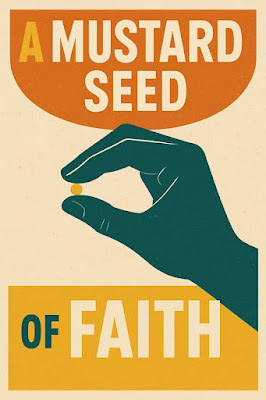17 Pentecost

October 5, 2025
Luke 17.5-10
+ I always joke that in my time as your priest here at St. Stephen’s , I havefelt like I have been pastor of threedifferent parishes.
By that, I mean, I mean St. Stephen’s has transformed into somethingvery different than it was let’s say 20 years ago.
As I thought about that, I found myself pondering what St.Stephen’s means to me.
I was thinking about the fact that one thing I am very proud ofhere is that when we say we are truly welcoming and inclusive.
We welcome everyone and we include everyone, even people who mightnot believe the same things about certain issues.
There truly is a wide spectrum of belief here at St. Stephen’s.
We encompass many people and beliefs here.
And I love that!
And, even people who don’t believe, or don’t know what theybelieve, are always welcome here.
Andincluded.
Thatincludes even atheists.
Ilove atheists, as many of you know.
AndI don’t mean, by saying that, that I love them because of some intent toconvert them.
No.
Mylove for atheists has simply to do with the fact that I “get” them.
Iunderstand them.
Iappreciate them.
AndI have lots of atheists in my life!
Agnosticsand atheists have always intrigued me.
Infact, as many of you know, I was an agnostic, verging on atheism, once a longtime ago in my life.
Asyou have heard me say many times, I still consider myself an agnostic to alarge extent.
Nowto be clear, agnosticism and atheism are two similar though different aspectsof belief or disbelief.
Anagnostic—gnostic meaning knowledge, an “a” in front of it negates that word, sono knowledge of God—is simply someone who doesn’t know if God exists or not.
Anatheist—a theist is a person who believes in a god, an “a” in front of itnegates it, so a person who does not believe a god—in someone who simply doesnot or cannot believe.
Youhave heard me say often that we are all agnostics, to some extent.
Thereare things about our faith we simply—and honestly—don’t know.
That’snot a bad thing.
It’sactually a very good thing.
Ouragnosticism keeps us on our toes.
Ithink agnosticism is an honest response.
Butatheism is interesting and certainly honest too, in this sense.
WheneverI ask an atheist what kind of God they don’t believe in, and they tell me, I,quite honestly, have to agree.
Whenatheists tell me they don’t believe in some white-bearded man seated on athrone in some far-off, cloud filled kingdom like some cut-out, some magic manliving in the sky from Monte Python’sSearch for the Holy Grail, then, I have to say, “I don’t believe in thatGod either.”
Iam an atheist in regard to that God—that idolatrous god made in our own image.
Ifthat’s what an atheist is, then count me in.
DorotheeSoelle, one of my all-time favorite theologians, one described herself as “atheistwho believes.”
AndI think many of “get” that statement.
Butthe God I do believe in—the God of mystery, the God of wonder and faith andlove—now, that God is a God I can serve and worship.
Andthis God of mystery and love that I serve has, I believe, reached out to us,here in the muck of our lives.
Andhas done so in the person of Jesus.
Certainlythat is not some distant, strange, human-made God.
Ratherit is a close, loving, God, a God who knows us and is with us.
Butthere are issues with such a belief.
Believingin a God of mystery means we now have work cut out for us in cultivating ourfaith in that God of mystery.
“Increaseour faith!” the apostles petition Jesus in today’s Gospel.
Andtwo thousand years later, we—Jesus’ disciples now—are still asking him toessentially do that for us as well.
It’san honest prayer.
Wewant our faith increased.
Wewant to believe more fully than we do.
Wewant to believe in a way that will eliminate doubt, because doubt isso…uncertain.
Doubtis a sometimes frightening place to explore.
Andwe are afraid that with little faith and a lot of doubt, doubt will win out.
Weare crying out—like those first apostles—for more than we have.
ButJesus—in that way that Jesus does—turns it all back on us.
Hetells us that we shouldn’t be worrying about increasing our faith.
Weshould rather be concerned about the mustard seed of faith that we have rightnow.
Thinkof that for a moment.
Thinkof what a mustard seed really is.
It’sone of the smallest things we can see.
It’sa minuscule thing.
It’sthe size of a period at the end of a sentence or a dot on a lower-case I (12point font).
It’sjust that small.
Jesustells us that with that little bit of faith—that small amount of real faith—wecan tell a mulberry tree, “be uprooted and planted in the sea.”
Inother words, those of us who are afraid that a whole lot of doubt can overwhelmthat little bit of faith have nothing to worry about.
Becauseeven a little bit of faith—even a mustard seed of faith—is more powerful thanan ocean of doubt.
Alittle seed of faith is the most powerful thing in the world, because that tinyamount of faith will drive us and push us and motivate us to do incrediblethings.
Anddoing those things, spurred on and nourished by that little bit of faith, does make a difference in the world.
Evenif we have 99% doubt and 1% faith, that 1% wins out over the rest, again andagain.
We are going to doubt.
Weare going to sometimes gaze into that void and have a hard time seeing, forcertain—without any doubt—that God truly is there.
Weall doubt.
Andthat’s all right to do.
Butif we still go on loving, if we still go on serving, if we still go on tryingto bring the sacred and holy into our midst and into this world even in theface of that 99% of doubt, that is our mustard seed of faith at work.
Thatis what it means to be a Christian.
Thatis what loving God and loving our neighbor as ourselves does.
Itfurthers the Kingdom of God in our midst, even when we might be doubting thatthere is even a Kingdom of God.
Now, yes, I understand that it’s weird to hear a priest get up here and saythat atheists and agnostics and other doubters can teach us lessons aboutfaith.
Butthey can.
Ithink God does work in that way sometimes.
Ihave no doubt that God can increase our faith by any means necessary, evendespite our doubts.
Ihave no doubt that God can work even in the mustard-sized faith found deepwithin someone who is an atheist or agnostic.
Andif God can do that in the life and example of an atheist, imagine what God cando in our lives—in us, who are committed Christians who stand up every Sundayin church and profess our faith in the Creed we are about to recite together.
So, let us cultivate that mustard-sized faith inside us.
Let’snot fret over how small it is.
Let’snot worry about weighing it on the scale against the doubt in our lives.
Let’snot despair over how miniscule it is.
Let’snot fear doubt.
Ithink a lot of Christians do, in fact, fear doubt.
Letus not be scared of our natural agnosticism.
Rather,let us realize that even that mustard seed of faith within us can do incrediblethings in our lives and in the lives of those around us.
Andin doing those small things, we all arebringing the Kingdom of God into our midst.
Amen.



